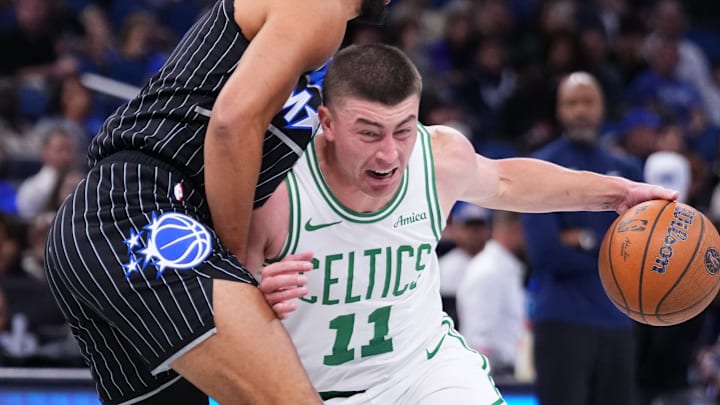ORLANDO — Growing pains were inevitable for the Boston Celtics. At this point in the season, the phrase has been worn out. New roster, new roles, new relationship dynamics. That much newness was bound to come with a certain level of uncertainty, especially with how much talent left Boston this summer.
But at a certain point, growing pains turn into patterns. And those patterns are the difference between winning and losing.
On Friday night against the Orlando Magic, the Celtics found themselves down double digits heading into the second quarter for the second straight game. They went down by 11 points against the Washington Wizards on Wednesday, and in Orlando, they found themselves in a 13-point hole after one.
All year long, the Celtics have fallen victim to one-quarter blow-ups, though the culprit behind the issue isn’t always the same.
“I think, Wizards, we just had a lack of energy,” said Payton Pritchard. “I think tonight, I didn't think we had a lack of energy. I just felt like, like I said, they hit threes that we were living with, and they made us pay for that.”
When do Celtics trends become Celtics reality?
Orlando was red-hot from deep. Boston’s help-and-rotate defense has been okay with giving up certain looks from beyond the arc, so long as they get a late contest. And against the Magic—one of the worst three-point shooting teams in the NBA—that strategy was implemented heavily.
It did not pan out.
“I think they got out in transition in both games, and I think they shot 7-for-12 in first quarter from three,” said Joe Mazzulla. “So, I think it was a little bit of a hot start from a shooting perspective. But they did get some transition there that we could definitely clean up, for sure.”
Those transition issues popped up throughout the game in Orlando, too.
The box score says Boston only gave up 11 fast-break points all game. But that doesn’t account for the numerous times Orlando inbounded the ball after a make and sprinted down the court for an easy bucket.
Nor does it track when the Magic’s offense moved so quickly that the Celtics couldn’t match up the way they wanted, completely disrupting the defensive game plan they’ve worked so hard to implement. “There were definitely five or six positions tonight where we gave up a layup regardless of our offensive result, and we have to clean those up, for sure,” Mazzulla said.
It happened against the Utah Jazz, too. Boston’s historically poor three-point performance was exacerbated by their inability to match up in transition.
Much like the one-quarter-per-game woes, it’s a growing pain turned trend.
“We got to match up better,” said Pritchard. “It's a matchup thing. I mean, we're gonna obviously try to pick up. Against a team that, they tried to start pushing, you don't really have a man. You just got to get back. Now, Franz did hit a tough and-one. I don't know how he made that, but. Over three people, but. It's stuff like that. We got it back to a tie game, and he comes back, and-one. So, those are the momentum plays we got to clean up.”
And with how much the Celtics are crashing the offensive glass this year, their transition defense starts way earlier than it may seem. If they want to prevent transition opportunities, they have to utilize a detailed approach when crashing.
“Crashing lanes,” Pritchard said. “It just means, when you're crashing, go through the free-throw line. Don't like take a—I sometimes even do it. I take a little baseline cut, get behind my man, and then he leaks and has a beat. So, you got to crash through the, we call it crashing through the nail. So, that will help with it.”
Small issues like one-quarter blunders and transition mix-ups have been chronic for Boston. There have been bright spots, but with their other offensive and defensive goals, some mishaps are bound to slip through the cracks. But sooner or later, those mishaps will become patterns. Then they will simply be a part of this Celtics team’s DNA.
And on nights like Friday, when those problems already reared their ugly heads, the Celtics can’t afford to slip up in areas where they’ve remained solid. Yet they did.
Boston is the league's lowest-turnover team, yet in the final few minutes of the fourth quarter on Friday, it committed three massive misplays. A Josh Minott turnover, a Neemias Queta take foul, and a Pritchard giveaway.
There was no worse time for the Celtics to falter, yet it all happened in the blink of an eye.
